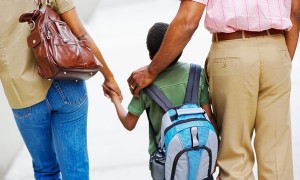But moving also means leaving friends, familiar places, and sights of home behind. While leaving these things behind is hard for adults, children and teenagers often experience additional difficulty. Children may feel intimidated by the thought of living in a new town, attending a new school, and making new friends.
Moving doesn’t have to be scary or intimidating though. Use the tips below to help your kids adjust to a new community.
1. Make Special Considerations for Children of Different Ages
Your children’s ages and personalities affect how they will respond to moving. While one of your children might adapt easily to a new place, another might need more help and emotional support to make the adjustment. Keep the following in mind:
- Infants, toddlers, and preschoolers will not understand the meaning and complexity of a move. They don’t interact with very many people outside of the home, and they don’t experience change very often. Young children thrive on predictably, so try to keep their routines as normal as possible once you’ve moved.
- Elementary school-aged children want to fit in with their peers. As a result, your children might feel scared about living in a new community. Focus on the excitement of attending
a new school and meeting new people. Tell them about a person or group of people, such as immigrants, who overcame their fears to come to exciting new places. - Although teens are old enough to understand the need to move, they might resist change. Teens may feel like they can’t establish valuable friendships in a new community, which might make it hard for them to transition into a new school. Moving is especially hard on teens who participate in sports or other extracurricular activities. To help ease your teens’ worry, research the programs in your new town. Does the high school have a state championship swimming team? Is there a state-of-the-art performance hall?
You have to focus on the positive to help kids transition to a new. Listen to their questions and concerns, and reassure them that they have things to look forward to.
2. Provide Support After the Move
The first few months in a new town prove volatile for many children, so pay extra attention to their emotional needs. Here are a few ways you can provide emotional support as your children settle into a new community:
- Explore your new community. Visiting nearby parks and finding the best local restaurants can help your whole family feel more at home.
- Find ways for your children to get involved in the new community. If your children participated in music or drama clubs in your former town, help them get involved in the same activities in your new town.
- Encourage your children to express their feelings. Many children want to know that they have a friend and confidant who understands what they’re going through. You can be that confidant. Listen carefully and intently as your children vent their frustrations. Don’t get short with them, as this can make them feel even more insecure.
3. Set an Example for Your Children
Children of all ages take cues from their parents, especially in new or scary situations. As you settle into your new community, model the kind of behavior and attitude you want your children to adopt. For example:
- Socialize with families in your new neighborhood. If you encourage your kids to get involved in the community but never leave the house, your children might take this is as a sign that they don’t need to branch out. Invite your neighbors and their children over for a dessert night. This will allow your children to meet new people in a n
 on-threatening setting.
on-threatening setting. - Stay up-to-date on events at school and in the community. The more you know and learn about your new community, the more your children will feel at home. On the other hand, the less you know about the community, the less likely your children are to embrace their new surroundings.
- Don’t complain about your new house or community in front of your kids. Chances are, you’ll feel frustrated or stressed about unpacking and settling into a new home. Try not to let your children see this frustration. If they hear you badmouthing your new community, they might do the same. This makes it harder for them to settle in.
Adjusting to a new community doesn’t have to be stressful or scary for you or your children. Focus on the positive aspects of the new community. Provide outlets from your children to vent their feelings and frustration. Set an example for them to look to as they adjust. By helping them feel at home in a new community, you’ll be able to enjoy your new adventure that much more.



